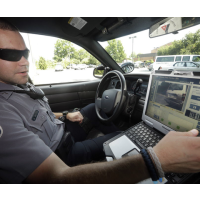Federal Appeals Court Rules that License Plate Readers Are Not Good Enough to Justify Detaining Drivers
 Police officer reviews license plate scan (photo: Martinez Monsivais, Associated Press)
Police officer reviews license plate scan (photo: Martinez Monsivais, Associated Press)
Police cannot rely solely on license-plate readers to pull over drivers suspected of breaking the law, a federal appeals court has ruled (pdf).
The decision arose from a case involving a female motorist in San Francisco who was wrongly detained after a police automatic license plate reader (ALPR) identified her car as stolen.
The ALPR, mounted in a squad car, misread one digit on Denise Green’s license plate, which triggered an alert that the vehicle was stolen. Per San Francisco Police Department policy, the officer in the ALPR-mounted car was supposed to verify he had the correct automobile, but didn’t. Then, a second officer responsible for pulling Green over also failed to notice the mistake, even though the wanted vehicle looked nothing like Green’s.
Nevertheless, back-up was called in and four officers drew their weapons on Green, who was forced from her car, handcuffed and ordered to kneel on the pavement.
She was later released once the mistake was discovered.
The incident resulted in Green suing San Francisco, raising the question whether technology alone is enough to legally justify a search under the Fourth Amendment.
Green lost her case in lower court. She petitioned the U.S. Ninth Circuit Court of Appeals to hear her case, which agreed and overturned the ruling. The District Court had granted summary judgment for the defendants, but the appellate court sent the case back to it for a determination of whether the police had “reasonable suspicion” to detain her or “probably cause” to arrest her (even if only briefly). The panel also wanted the lower court to determine if “excessive force” had been used by the police.
The appellate court made a point of noting the limitations of license plate readers in chastising police for not double-checking the machine. “It is undisputed that the ALPR occasionally makes false ‘hits’ by misreading license plate numbers and mismatching passing license plate numbers with those listed as wanted in the database,” Judge William K. Sessions III wrote for the court.
Law enforcement agencies across the country are embracing the plate scanner technology, indiscriminately photographing innocent citizens’ cars and automatically feeding the information into databases for future reference. Los Angeles-area law enforcement agencies have reportedly photographed and scanned at least 180 million license plate images into a database.
“This case shows clearly the risks of blind reliance on technology for identification in criminal investigations,” Jennifer Lynch wrote at the Electronic Frontier Foundation. “If the ALPR camera had not alerted the first officer based on a false license plate read, Green never would have been stopped, and this tragedy could easily have been avoided.”
–Noel Brinkerhoff
To Learn More:
New Ninth Circuit Opinion Calls into Question Blind Reliance on License Plate Camera IDs (by Jennifer Lynch, Electronic Frontier Foundation)
Error from License Plate Scanner Leads to Police Stop That Startles PV-Based Attorney (by Jay Senter, Prairie Village Post)
Denise Green v. San Francisco (U.S. Ninth Circuit Court of Appeals) (pdf)
L.A. Law Enforcement Sued over License Plate Scanners that Profile Drivers in a Database (by Ken Broder, AllGov California)
Do License Plate Readers Invade Privacy, or Are They a Protected Form of Free Speech? (by Noel Brinkerhoff, AllGov)
License Plate Readers Collect Data on Millions of Americans (by Noel Brinkerhoff, AllGov)
- Top Stories
- Controversies
- Where is the Money Going?
- California and the Nation
- Appointments and Resignations
- Unusual News
- Latest News
- California Forbids U.S. Immigration Agents from Pretending to be Police
- California Lawmakers Urged to Strip “Self-Dealing” Tax Board of Its Duties
- Big Oil’s Grip on California
- Santa Cruz Police See Homeland Security Betrayal in Use of Gang Roundup as Cover for Immigration Raid
- Oil Companies Face Deadline to Stop Polluting California Groundwater





